- Home
- Jodi Picoult
Keeping Faith Page 2
Keeping Faith Read online
Page 2
That makes me think of her coffin table, and of the ballet lesson Faith and I never did manage to get to three days ago. I pull away from her grasp and cover my face, fresh tears running like wax. "What is the matter with me?"
"Absolutely nothing, in spite of what that cretin wants you to believe." My mother puts her hands on my burning cheeks. "This is not your fault, Mariah. This isn't something you could have stopped before it happened. Colin isn't worth the ground he walks on." She spits on the carpet, to prove it. "Now sit up so that I can bring Faith in here."
That gets my attention. "She can't see me like this."
"So, change."
"It's not that easy--"
"Yes, it is," my mother insists. "It's not just you this time, Mariah. You want to fall apart? Fine, then--do it after you've seen Faith. You know I'm right, or you wouldn't have called me to come over here and take care of her three days ago." Staring at me, she softens her voice. "She's got an idiot for a father, and she's got you. You make what you want of that."
For a second I let hope sneak through the cracks in my armor. "Did she ask for me?"
My mother hesitates. "No...but that's neither here nor there."
As she goes to get Faith, I adjust the pillows behind my back and wipe my face with a corner of the comforter. My daughter enters the room, propelled by my mother's hand. She stops two feet from the bed. "Hi," I say, bright as any actress.
For a moment I just delight in seeing her--the crooked part of her hair, the space where her front tooth used to be, the chipped pink Tinkerbell polish on her fingernails. She folds her arms and sets her colt's legs and mulishly presses her beautiful bow of a mouth into a flat line.
"Want to sit down?" I pat the mattress beside me.
She doesn't answer; she barely even breathes. With a sharp pain I realize that I know exactly what she's doing, because I've done it myself: You convince yourself that if you keep perfectly still, if you don't make any sudden moves, neither will anyone else. "Faith..." I reach out my hand, but she turns and walks out of the room.
Part of me wants to follow her, but a larger part of me can't muster the courage. "She's still not talking. Why?"
"You're her mother. You find out."
But I can't. If I have learned anything, it is my own limits. I turn onto my side and close my eyes, hoping that my mother will get the hint that I just want her to go away.
"You'll see," she says quietly, laying her hand on top of my head. "Faith is going to get you through this."
I make her think I am asleep. I do not let on when I hear her sigh. Or when I watch, through narrowed eyes, as she removes from my nightstand an X-acto knife, a nail file, and a pair of embroidery scissors.
Years ago when I found Colin in bed with another woman, I waited three nights and then tried to kill myself. Colin found me and got me to the hospital. The ER doctors told him they had been able to save me, but that isn't true. Somehow that night, I got lost. I became another person, one I do not like to hear about, one I would certainly not recognize. I could not eat, I could not speak, I could not command enough energy to throw the covers off my body and get out of bed. My mind was frozen on a single thought: If Colin didn't want me anymore, why should I?
When Colin told me that he was having me committed to Greenhaven, he cried. He apologized. Still, he never held my hand, never asked me what I wanted, never stared into my eyes. He said I needed to be hospitalized so that I would not be left alone.
Contrary to what he thought, I wasn't alone. I was several weeks pregnant with Faith. I knew about her, knew she existed before the tests came back and the doctors altered the course of treatment to meet the needs of a pregnant, suicidal woman. I never told anyone there about the pregnancy, just let them figure it out themselves--and it took me years to admit that was because I was hoping to miscarry. I had convinced myself that it was Faith, a small ball of cells inside me, who made Colin turn to another woman.
Yet when my own mother says that Faith is going to keep me from getting so deeply depressed that I can't claw my way out, she may not be far off the mark. After all, Faith has done it before. Somehow, during those months at Greenhaven, being pregnant became an asset instead of a liability. People who would not listen to what I had to say when I was first committed stopped to remark on my swelling belly, my glowing cheeks. Colin found out about the baby and came back to me. I named her Faith, a real goyishe name according to my mother, because I so badly needed something to believe in.
I am sitting with my hand on the bridge of the phone. Any minute now, I tell myself, Colin is going to call and tell me it was a run of dementia. He will beg not to be held responsible for this small bit of insanity. If I do not understand something like that, who will?
But the phone does not ring, and sometime after two in the morning I hear a noise outside. It is Colin, I think. He's come.
I run to the bathroom and try to untangle my hair, my arms stiff and aching from disuse. I swallow a capful of mouthwash. Then I rush into the hall with my heart pounding.
It's dark. There's no one moving about; nothing. I creep down the staircase and peer out the sidelight that frames the front door. Carefully I ease the door open--it creaks--and step onto the old farmer's porch.
The noise that I thought was my husband coming home to me is a pair of raccoons, thieving around the trash can. "Go!" I hiss at them, waving my hands. Colin used to snare them in a Hav-A-Heart trap, a rectangular cage with a levered door that didn't cause harm to the animal. He'd hear one screaming after being shut in and would carry it off to the woods behind the house. Then he'd walk back, the cage empty and neat, with no sign of the raccoon's having been there. "Abracadabra," he'd say. "Now you see it, now you don't."
I retreat inside, but instead of heading upstairs I see the moon reflecting off the polished dining-room table. In the center of the oval is a miniature replica of this farmhouse. I made it; it is what I do for a living. I build dream houses--not out of concrete and drywall and I-beams, but with spindles no bigger than a toothpick, squares of satin that fit in the palm of my hand, mortar based with Elmer's glue. Although some people ask for an exact replica of their house, I have also created antebellum mansions, Arabian mosques, marble palaces.
I built my first dollhouse seven years ago at Greenhaven, out of popsicle craft sticks and construction paper, when other patients were making God's-eyes and origami. Even in that first attempt there was a spot for every bit of furniture, a room to suit each personality. Since then I have built nearly fifty others. I became famous after Hillary Rodham Clinton asked me to make the White House for Chelsea's sixteenth birthday--complete with an Oval Room, china in the display cabinets, and a hand-sewn United States flag in the Executive Office. Customers have asked, but I do not make dolls to go with the houses. A piano, however tiny, is still a piano. But a doll with a beautifully painted face and finely turned limbs is always, at its heart, made of wood.
I pull out a chair and sit down, gently touching my fingers to the sloping roof of the miniature farmhouse, the pillars that hold up its porch, the small silk begonias in its terra-cotta planters. Inside it is a cherry table like the one this dollhouse sits upon. And on that miniature cherry dining-room table is an even smaller replica of this dollhouse.
With the flick of a fingertip I shut the front door of the dollhouse. I brush my thumb along the stamp-sized windows, sliding them down. I secure the shutters with their infinitesimal latches; I shelter the begonias beneath the Lilliputian porch swing. I close up the house tightly, as if it might need to stand through a storm.
Colin phones four days after leaving. "This wasn't the way it was supposed to happen."
Presumably, by this he means that Faith and I weren't supposed to interrupt. Presumably, we had forced his hand. But of course I do not say so.
"It's not going to work with us, Mariah. You know that."
I hang up the phone while he is still talking, and pull the covers over my head.
Five days
after Colin has left, Faith is still not speaking. She moves around the house like a silent cat, playing with toys and picking out videos and all the time watching me suspiciously.
My mother is the one who manages to plumb through the muteness to figure out that Faith wants oatmeal for breakfast, or that she can't reach the Playmobil village on the top shelf, or that she needs a drink of water before going to bed. I wonder if they have a secret language. I don't understand her; she refuses to communicate, and all in all it reminds me of Colin.
"You have to do something," my mother repeats. "She's your daughter."
Biologically, yes. But Faith and I have little in common. In fact, she might as well have skipped a generation and come straight from her grandmother, so close are those two. They have the same grounding in whimsy, the same rubber resilience, which is why it is so strange to see Faith moping around. "What am I supposed to do?"
My mother shakes her head. "Play a game with her. Go for a walk. At the very least, you could tell her you love her."
I turn to my mother, wishing it were that simple. I've loved Faith since she was born, but not the way you'd think. She was a relief. After first wanting to miscarry and then months on Prozac, I'd been certain she'd appear with three eyes or a harelip. But the easy, normal birth gave way to the reality of a baby I could not make happy, as if my punishment for thinking the worst of her were to be disconnected before we ever had a chance to bond. Faith was colicky; she kept me up all night and nursed with such a vengeance my belly cramped at each feeding. Sleep-deprived and unsettled, I would lay her on the bed at times, stare at her wise, round face and think, What on earth do I do with you?
I figured that motherhood would be something that descended naturally, the same way my milk came in--a little painful, a little awe-inspiring, but part of me now for better or for worse. I waited patiently. So what if I didn't know how to use a rectal thermometer on my child? So what if I tried to swaddle her and the blanket never tucked tight? Any day now, I told myself, I am going to wake up and know what I am doing.
It was sometime after Faith's third birthday that I stopped hoping. For whatever reason, being a mother will never come easily to me. I watch women with multiple children effortlessly settle everyone in place in their vans, while I have to check Faith's safety belt three times, just to make sure it's really snapped tight. I hear mothers lean down to speak to their children, and I try to memorize the things they say.
The thought of trying to get to the bottom of Faith's stubborn silence makes my stomach flip. What if I can't do it? What kind of mother does that make me? "I'm not ready," I hedge.
"For God's sake, Mariah, get over yourself. Get dressed, brush your hair, act like a normal woman, and before you know it, you won't be acting anymore." My mother shakes her head. "Colin told you you were a shrinking violet for ten years, and you were stupid enough to believe him. What does he know from nervous breakdowns?"
She sets a cup of coffee in front of me; I know that she considers it a triumph to have me sitting at the kitchen table, instead of holed up in bed. When I was committed, she was living in Scottsdale, Arizona--where she'd moved after my father died. She flew in after my suicide attempt and went home when she felt assured that the danger was over. Of course, she hadn't counted on Colin's having me institutionalized. When she discovered what he had done, she sold the condo, returned here, and spent four months overturning the legal writ so that I could be released of my own volition. She never believed Colin was right to have me sent to Greenhaven, and she's never forgiven him. As for me, well, I don't know. Sometimes, like my mother, I think that he shouldn't have been deciding how I felt, no matter how unresponsive I was at the time. And sometimes I remember that Greenhaven was the one place I felt comfortable, because there nobody was expected to be perfect.
"Colin," my mother says succinctly, "is a schmuck. Thank God Faith takes after you." She pats my shoulder. "Do you remember the time you came home in fifth grade, with a B-minus on your math test? And you cried like you thought we were going to put you on the rack--but we couldn't have cared less? You did your best; that's what was important. You tried. Which is more than I can say for you today." She looks through the open doorway, to the living-room floor, where Faith is coloring with crayons. "Don't you know by now that raising a child is always a work in progress?"
Faith picks up the orange crayon and scribbles violently over the construction paper. I remember how last year, when she was learning letters, she'd scrawl a long stream of consonants and ask me what she'd spelled. "Frzwwlkg," I'd say, and to my surprise I made her laugh.
"So go already." My mother pushes me toward the living room.
The first thing I do is trip over the box of crayons. "I'm sorry." I gather fistfuls in my hands, set them back in the holiday Oreo tin we use to store them. When I'm finished, I rock back on my heels, to find Faith staring coldly at me.
"I'm sorry," I say again, but I am not speaking of the crayons.
When Faith doesn't respond, I look down at the paper she's been drawing on. A bat and a witch, dancing beside a fire. "Wow--this is really neat." Inspiration strikes; I pick up the drawing and hold it close. "Can I keep it? Hang it downstairs in my workshop?"
Faith tips her head, reaches for the picture, and rips it down the middle. Then she runs up the stairs and slams her bedroom door.
My mother comes in, wiping her hands on a dish towel. "That went well," I say dryly.
She shrugs. "You can't change the world overnight."
Reaching for one half of Faith's artwork, I run my fingers over the waxy resistance of the witch. "I think she was drawing me."
My mother tosses the dish towel at me; it lands unexpectedly cool against my neck. "You think too much," she says.
That night while I am brushing my teeth I catch sight of myself in the mirror. I am not unattractive, or so I learned at Greenhaven. Orderlies and nurses and psychiatrists look through you when you are disheveled and complaining; on the other hand, a pretty face gets noticed, and spoken to, and answered. At Greenhaven I cut my hair short, into honey-colored waves; I wore makeup to play up the green of my eyes. I spent more time on my appearance during those few months than I ever had in my life.
Sighing, I lean toward the mirror and wipe a spot of toothpaste from the corner of my mouth. When Colin and I moved into this farmhouse, we replaced this bathroom mirror. The old one had been cracked at the corner--bad luck, I said. The new mirror, we didn't know where to hang. At five-foot-four, eye level for me was not eye level for Colin. A foot taller and lanky, he laughed when I'd first held up the mirror. "Rye," he said, "I can barely see my chest."
So instead we put the mirror where Colin could see it. I would stand on tiptoe to see the whole of my face. I never quite measured up.
In the middle of the night I feel the blankets rustle. A drift of air, a soft solidness pressed against me. Rolling over, I wrap my arms around Faith.
"This is what it would be like," I whisper to myself, and I let my throat swell up before I can even finish my thought. Her arms come around me like a vine. Her hair, tucked beneath my chin, smells of childhood.
My mother used to tell me that when push comes to shove, you always know who to turn to. That being a family isn't a social construct, but an instinct.
The flannel of our nightgowns hooks and catches. I rub Faith's back in silence, afraid to say anything that might ruin this good fortune, and I wait for her breathing to level before I let myself fall asleep. This one thing, this I can do.
The town where we live, New Canaan, is large enough to have its own mountain, small enough to hold rumors in the nooks and crannies of the weathered clapboard storefronts. It is a town of farms and open land, of simple people rubbing shoulders with professionals from Hanover and New London who want their money to go a little bit further in real estate. We have a gas station, an old playground, and a bluegrass band. We also have one attorney, J. Evers Standish, whose shingle I've passed a million times driving up and
down Route 4.
Six days after Colin has left, I answer the front door to find a sheriff's deputy on the porch, asking me if I am indeed Mrs. Mariah White. My first thought is for Colin--has he been in a car accident? The sheriff reaches into his pocket and pulls out an envelope. "I'm sorry, ma'am," he says, and he is gone before I can ask him what he's brought me.
The first concrete act of divorce is called a libel. It's a little piece of paper that, held in your hand, has the power to change your whole life. I will not know until months later that New Hampshire is the only state that still calls it a libel, instead of a complaint or a petition, as if part of the process, however amicable, involves a slight to one's character. Attached to the note is the piece of paper that says a divorce is being served against me.
Thirty minutes later I am sitting in the waiting room of J. Evers Standish's office, Faith curled in the corner with a battered Brio train set. I would not have brought her, but my mother has been gone all morning--off, she said, to get us both a surprise. A door behind the receptionist opens, and a tall, polished brunette walks out, hand extended. "I'm Joan Standish."
My jaw drops open. "You are?" For years, in passing the building, I've pictured J. Evers Standish as an older man with muttonchops.
The attorney laughs. "The last time I checked, I was." She glances at Faith, absorbed in creating a tunnel for the train. "Nan," she asks her receptionist, "could you keep an eye on Mrs. White's daughter?" And as if I am pulled by a thread, I follow the lawyer into her office.
The funny thing is, I'm not upset. Not nearly as upset as I was the afternoon Colin left. Something about this libel seems completely over the top, like a joke with the punch line forthcoming. Something Colin and I will laugh about when the lights are out and we're holding each other a few months from now.
Joan Standish explains the libel to me. She asks me if I want to see a therapist or hear about referral programs. She asks what happened. She talks about divorce decrees and financial affidavits and custody, while I let the room whirl around me. It seems impossible that a wedding can take a year to plan but a divorce is final in six weeks--as if all the time in between, the feelings have been dwindling to the point where they can be scattered with one angry breath.

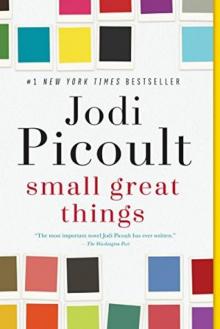 Small Great Things
Small Great Things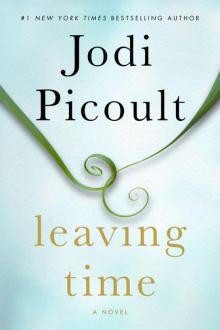 Leaving Time
Leaving Time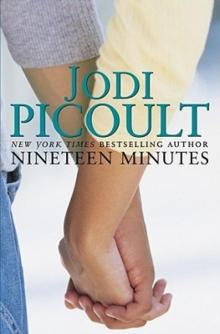 Nineteen Minutes
Nineteen Minutes Larger Than Life
Larger Than Life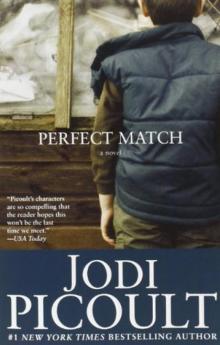 Perfect Match
Perfect Match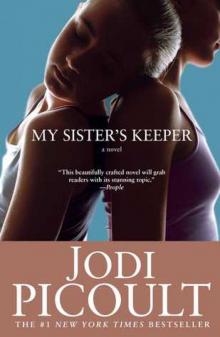 My Sister's Keeper
My Sister's Keeper The Pact
The Pact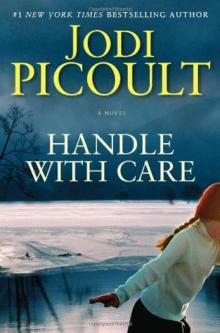 Handle With Care
Handle With Care Songs of the Humpback Whale
Songs of the Humpback Whale Mermaid
Mermaid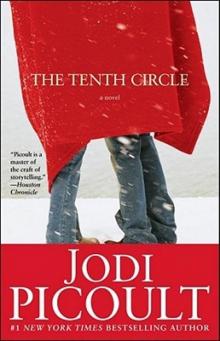 The Tenth Circle
The Tenth Circle The Color War
The Color War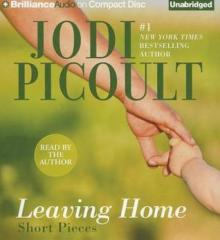 Leaving Home: Short Pieces
Leaving Home: Short Pieces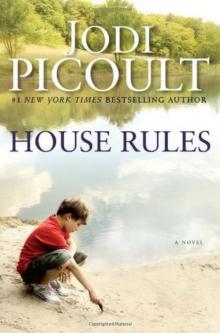 House Rules
House Rules Lone Wolf
Lone Wolf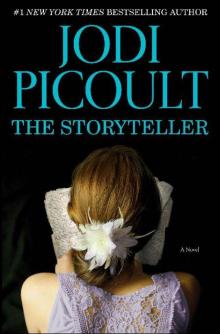 The Storyteller
The Storyteller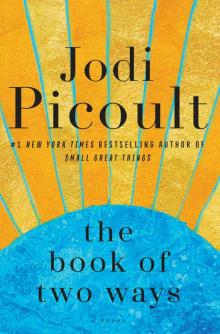 The Book of Two Ways
The Book of Two Ways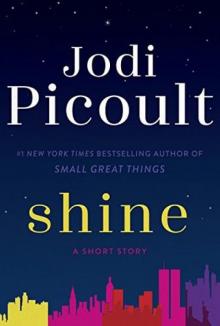 Shine
Shine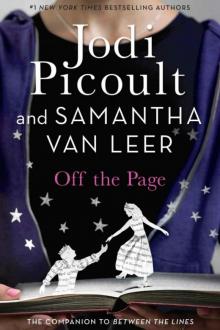 Off the Page
Off the Page Sing You Home
Sing You Home Second Glance: A Novel
Second Glance: A Novel Mercy
Mercy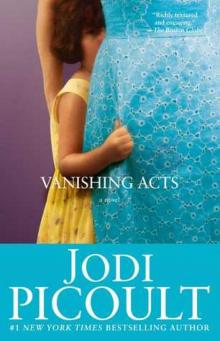 Vanishing Acts
Vanishing Acts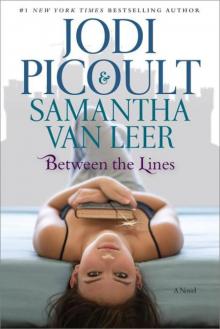 Between the Lines
Between the Lines Plain Truth
Plain Truth Salem Falls
Salem Falls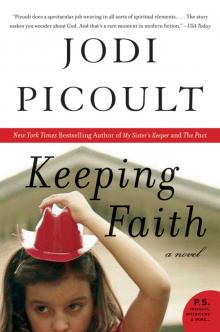 Keeping Faith
Keeping Faith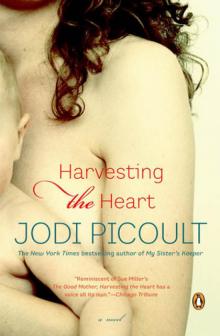 Harvesting the Heart
Harvesting the Heart Change of Heart
Change of Heart Where There's Smoke
Where There's Smoke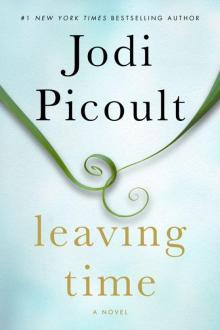 Leaving Time: A Novel
Leaving Time: A Novel Over the Moon
Over the Moon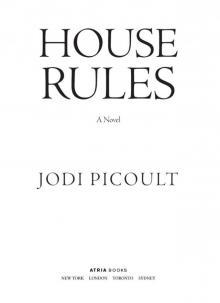 House Rules: A Novel
House Rules: A Novel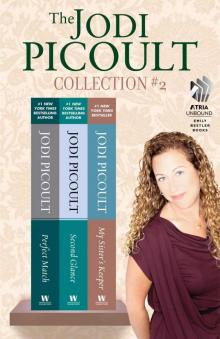 The Jodi Picoult Collection #2
The Jodi Picoult Collection #2 Leaving Home: Short Pieces (Kindle Single)
Leaving Home: Short Pieces (Kindle Single)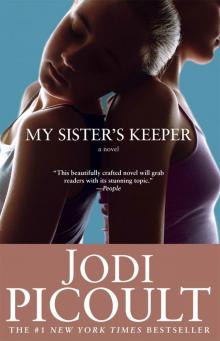 My Sister's Keeper: A Novel
My Sister's Keeper: A Novel![Mermaid [Kindle in Motion] (Kindle Single) Read online](http://i1.bookreadfree.com/i1/04/03/mermaid_kindle_in_motion_kindle_single_preview.jpg) Mermaid [Kindle in Motion] (Kindle Single)
Mermaid [Kindle in Motion] (Kindle Single)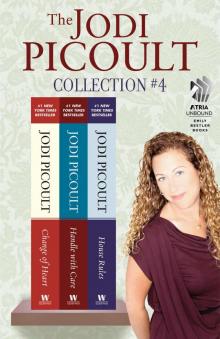 The Jodi Picoult Collection #4
The Jodi Picoult Collection #4 Sing You Home: A Novel
Sing You Home: A Novel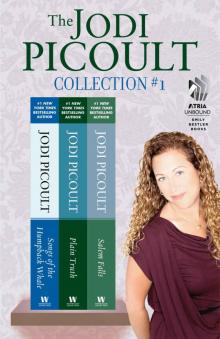 The Jodi Picoult Collection
The Jodi Picoult Collection Lone Wolf A Novel
Lone Wolf A Novel Second Glance
Second Glance Larger Than Life (Novella)
Larger Than Life (Novella)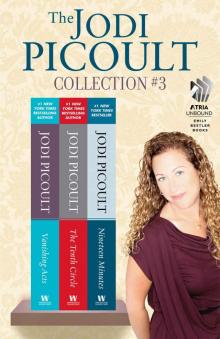 The Jodi Picoult Collection #3
The Jodi Picoult Collection #3